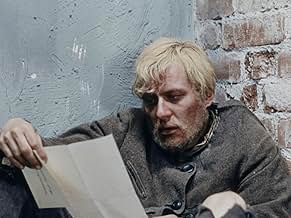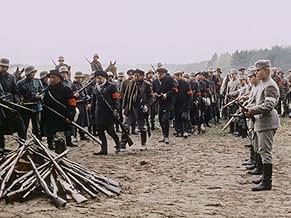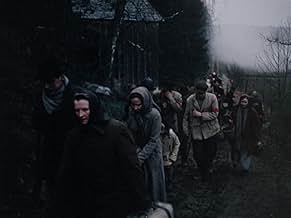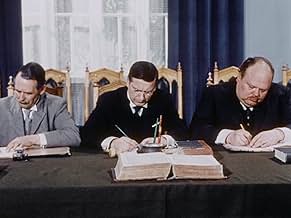Täällä Pohjantähden alla
- 1968
- 3h 6m
Täällä Pohjantähden alla is based on the book with the same title. It is a story of the little village. The movie starts in the 1890's and it ends to the Finnish civil war in 1918. Story con... Read allTäällä Pohjantähden alla is based on the book with the same title. It is a story of the little village. The movie starts in the 1890's and it ends to the Finnish civil war in 1918. Story concentrates around a tenant farmer family, although it gives us a good look at the society a... Read allTäällä Pohjantähden alla is based on the book with the same title. It is a story of the little village. The movie starts in the 1890's and it ends to the Finnish civil war in 1918. Story concentrates around a tenant farmer family, although it gives us a good look at the society at whole. While the class struggle depends, people of the village are driven to bloody civi... Read all
- Awards
- 4 wins total
Featured reviews
The story, starting just before Finland gains its independence, is a multi-generation spanning history of a newly independent nation dealing with inner turmoil, told through the eyes of a little community, with an emphasis on the Koskela-family. The first half of the film is set around Jussi Koskela, a poor, mild-mannered man who's trying to get ahead in life, while the second half mostly revolves around Jussi's son: Akseli, a passionate and fiery-tempered young man also trying to get ahead in life, but by far more radical ways than his father. The main theme is the class struggle between the rich and the poor (the "whites" and the "reds") which would eventually escalate to a full-blown, bitter, civil war. Although not forgetting the joys of life, like in the form of the tender romance between Akseli and Elina.
While the examination of what lead to the conflict is equally important, the civil war takes the major part of the film. What makes this the definitive portrait of the war, is that, while it is told from the reds' point-of-view, it doesn't "choose sides", rather just documents a national tragedy. Atrocities and war crimes toward civilians are done by both sides and the "trials" held during and after the war are more about settling personal vendettas than actually passing justice. Incidentally the best moments of the movie are in the last quarter when the drama reaches its harrowing and heartbreaking conclusion.
Most of the films excellence must be attributed to the masterful source novel, but even so, just the fact that this is so well adapted is praiseworthy in itself. The essential parts of the book have translated well to the screen (in content, but also in Linna's slyly sardonic tone) and the pacing is excellent, the film moves on a brisk pace for a 190 minute epic. It's visually appealing, not exactly stunning, but definitely well-shot and musically memorable. On the other hand, the films major weakness lies in the badly dated acting. The main players are all solid; some, like Aarno Sulkanen (as Akseli) are even great; but unfortunately many of the minor players range from plain hammy to grating "scenery-chewing", but that one complaint aside, the film is captivating, incredibly touching, unforgettable achievement..
Finnish cinema does not get more essential than this. If you ever have the chance to see it I highly recommend giving it a try.
The movie and novel it's based upon are both important, since they bring out the viewpoint of the losing side of the civil war, into which the social changes eventually led. Finnish people bore the scars of the civil war for many decades, and this novel was the first one to take upon the task of healing those scars.
The working class is being pressed on the edge. They are barely more than serfs and have no means of claiming the land they're cultivating and taking care of. The conditions in Finland are fluctuating at best, since the country is still an autonomic part of Russia with it's sovereign rights being disputed. The movie tells of a certain Koskela family trying to make a secure living under these circumstances on the fields they've cleared of the swamps and in the house they built from trees growing in the forests.
Each and every Finn should watch this movie to understand their own roots a lot better!
The story begins in the late 19th century when Finland is still part of the Russian empire. A poor farmer named Jussi Antinpoika (Risto Taulo) is allowed to build his own cottage on a swamp, provided that he pays his rent to the landowner without complaints. The humble Jussi agrees, sets up some crops and a house called Koskela and marries a local woman named Alma (Anja Pohjola). While Jussi and Alma like to live peacefully and pay the rising rents by working without complaints, the changing political climate of the country affects their lives as well: growing awareness of workers' rights and socialist movements in Russia has reached the community and eventually a workers' union is formed by a local tailor Halme (Kalevi Kahra). In the meanwhile, the three sons of Jussi and Alma have grown from boys to men and also take part in the socialist activity. When the Civil War of 1918 begins, the Red forces of the Pentinkulma municipality are led by the eldest son Akseli (Aarno Sulkanen), who initially insists on keeping the rebellion bloodless, but ultimately cannot control the wave of violence rolling over the country.
Some understanding of the tenant system that once defined the lives of many poor peasants and eventually gave birth to the division of the people into the Reds (workers) and the Whites (landowners) will facilitate grasping the story, but the plot is perfectly understandable for attentive viewers even without knowledge of Finnish history. The slowly rising tension between the workers and the patriotic, anti-Russian landowners is portrayed without haste, allowing the relations of the classes develop naturally. Never does the story become preachy in favour of either side of the conflict; both are guilty of many atrocities. The less intense supporters of both sides are also appalled to see how their respective causes have incited so much violence: Red tailor Halme and White Pastor Salpakari (Matti Ranin) carry a calm breeze of peace amidst all the unrest.
Besides the epic Nation-in-Turmoil plot lines, the story also has time to examine more down-to-earth, personal relationships of the characters. The family life of Jussi and Alma, and later Akseli and his wife Elina (Titta Karakorpi), is also skilfully portrayed and doesn't feel like a distraction from the big picture. The colourful characters in the village also add their charm to the whole, be it the always cheery Otto Kivivuori (Kauko Helovirta) or the unlucky Anttoo Laurila (Veikko Sinisalo) whose eviction in the middle of the coldest winter gives a spark to the growing Red movement in the municipality. Also, unlike in many other older Finnish films, there are no traces of theatricality in any of the performances. The focus is moved naturally from one generation to another, and over the three hours of the film it is easy to start caring for the people of Pentinkulma, making the tragic ending feel very sad, but ultimately not completely hopeless.
The intricacies of the plot can be attributed to author Linna, but director Laine deserves praise for the cinematic qualities of the film version too. The rich colours of the scenery during the changing seasons, the massive group scenes and battle sequences and the pacing of the plot are all well done. Even if the narrator's voice feels like a somewhat literal solution at first, it is ultimately not used too much and doesn't interfere with the visual storytelling distractingly. The music is also completely fitting, from the famous wedding waltz of Akseli and Elina to the socialist working class songs that are heard both as performed by the characters and as parts of the non-diegetic score.
I have to admit I haven't read Linna's novels, but I enjoyed the film very much. Much like in The Unknown Soldier, the action and personal drama are in good balance and the film helps to cast light on the tragic era of Finnish history. Täällä Pohjantähden alla can safely be called one of the essential Finnish films, and it is recommended to anyone interested in history and the Civil War of the country.
The first part of the film marches on at breakneck speed. As some 20 years of story are compressed into roughly one hour of film, there are some jarring time jumps if you do not know the book, lack the historical knowledge, or simply fail to pay attention to every scene. The tone of the film is also something to be praised. It starts with light-hearted though dramatic scenes, with plenty of humorous exchanges and musical scores. Once the civil war breaks out, this lightness is tossed out and the horrible events are depicted almost without any score, in a matter-of-fact, documentary-style.
"Täällä Pohjantähden Alla" is a classic that everyone should see at least once.
Did you know
- TriviaNight battle scene at the end of the movie is based on thrue events at the battle of Syrjäntaka at Tuulos, Finland. This battle was fought between Finnish Red Guards and Imperial German forces at April 28-29 1918.
- ConnectionsEdited into Pohjantähti (1973)
- SoundtracksAkselin ja Elinan häävalssi
Written by Heikki Aaltoila
- How long is Here, Beneath the North Star?Powered by Alexa
Details
- Release date
- Country of origin
- Language
- Also known as
- Here, Beneath the North Star
- Filming locations
- Production companies
- See more company credits at IMDbPro
Box office
- Budget
- FIM 900,000 (estimated)
- Runtime3 hours 6 minutes
- Sound mix
- Aspect ratio
- 1.78 : 1
Contribute to this page




















